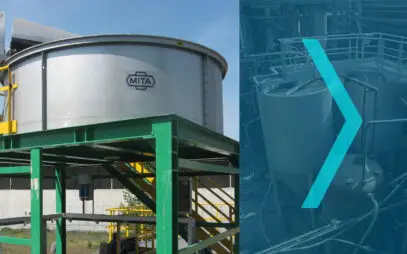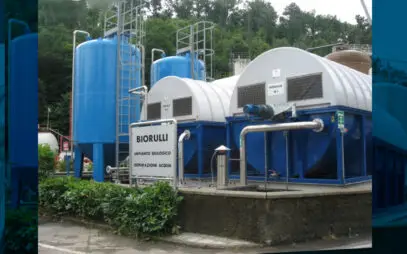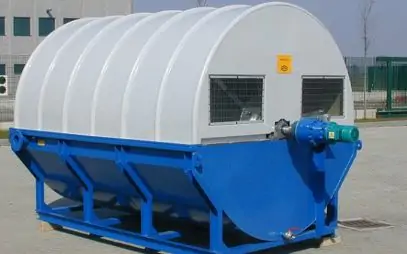Examples of areas: Companies producing detergents, cosmetics, paints, agricultural fertilizers.
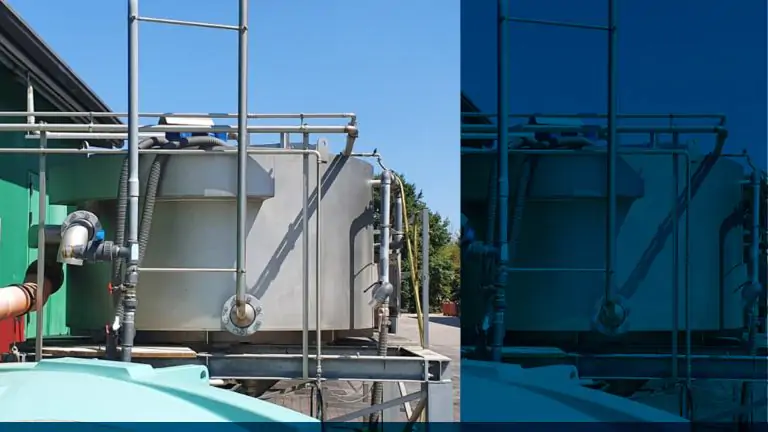
Water Treatment for the Chemical Industry
Toxicity and significant organic components often characterize chemical industry wastewater. Some of MITA Water Technologies’ solutions facilitate the removal of pollutants, especially downstream of physical-chemical treatments: Biorulli® biodiscs, lamella-pack decanters, and free-fiber cloth filters.
Main requirements: organic matter removal, securing water polluted by toxic factors, sludge separation generated by physical-chemical treatment.
Wastewater treatment systems for the chemical industry
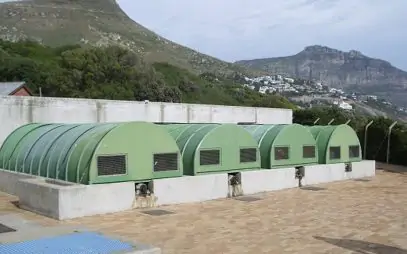
Biorulli® Biorotors B 200
The disc rollers, B 200 series, are the Biorulli® biodiscs biological oxidation solution: allowing high versatility in the face of widely varying effluent loads throughout the year. All this in conjunction with truly affordable acquisition costs.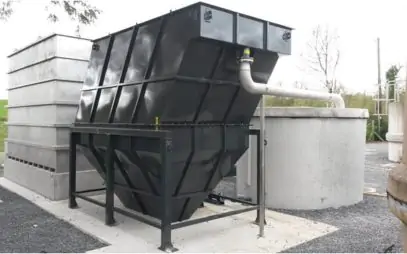
Flowpack Lamella Decanters Monoblock FM
Solid-liquid separation, sludge decanting, water clarification for further finishing operations-all these are represented by the FM Monoblock Series lamella decanters. Compact, efficient and space-saving solution. Simplicity of operation and very low product life cycle costs are pluses appreciated by customers in the civil and industrial fields.
Vertical-Axis Disc Filters PECV VM
An optimal solution for small and medium-sized plants, as much for its compactness as for its simplicity of installation and operation: these are the PECV VM metal tank vertical axis disc filters, for the final separation of suspended solids from civil and industrial wastewater.Process water treatment in the chemical industry
Wastewater produced by the chemical industry often has certain peculiarities: it can often contain a wide range of substances such as solvents, reagents, oils or greases, and other impurities related to production processes. It is not uncommon for the substances dissolved in the effluent to be derived from organic synthesis.
Thus, here are some requirements that, by way of example, can be noted.
- Toxicity and chemical pollutants. The components listed so far can increase the hazardous levels of wastewater, affecting human health and the environment if not properly treated.
- pH changes. This is a factor often common to water from chemical processing. Consequently, appropriate treatments (often chemical in nature themselves) must be conducted to ensure that the water meets environmental standards.
- Water conservation and reuse. As an industry that often uses large quantities of this resource (especially fresh water), the need to carry out circular processes and make eco-efficiency in the chemical industry is keenly felt.
These are illustrative needs, based on the experience of MITA Water Technologies: before selecting the best water treatment solution, it is good to always conduct tests with pilot units (to evaluate the optimal solution for the target).

MITA solutions for chemical industry wastewater
We have seen how substances dissolved in chemical industry wastewater are often derived from organic synthesis and are, therefore, very often biodegradable.
For the degradation of such pollutants, MITA Water Technologies offers an extremely simple but effective solution: the Biorulli® biological oxidation system with rotating contactors. Biorulli® “biodiscs” are composed of numerous plastic discs, which are alternately immersed and brought back into contact with the air: the oxygen in the environment stimulates the formation of a flora of aerobic bacteria which, once immersed, degrade the organic matter into easily removable sludge.
In addition, wastewater produced by this type of industry is often treated with chemical and physical treatments. Two MITA solutions successfully fit downstream of such treatments for separating the sludge generated (depending on the quantity and quality of the effluent): the Flowpack lamella-pack decanters and the aforementioned Biorulli® biodiscs.
Finally, for the final filtration of suspended solids in quantities comparable to tens of mg/l, one of the most efficient solutions remains free-fiber cloth filters: mechanical strength, very high particle separation yield, energy use limited to the cloth backwashing stages.
Finally, for final filtration of suspended solids in amounts comparable to tens of mg/l, one of the most efficient solutions remain free-fiber cloth filters: mechanical strength, very high particle separation yield, energy utilization limited to cloth backwash steps.
Ask for InformationSome MITA projects
- Industrial Wastewater
- Suspended Solid Removal
- BOD and COD Removal
- Oil and Grease Removal
- Biorulli® Biodiscs
- Dissolved Air Flotation Units
- Continuous Sand Filters
Water Treatment and Cooling Systems for Vedani Group
Various industrial water treatment technologies as well as cooling technologies: since 1995 MITA Water Technologies has provided multiple solutions, together with its "sister" company MITA Cooling Technologies, for the complete water management of Vedani Group, which has been active in aluminum processing since 1982.
Read moreBiological Rotors for the Chemical Company Icap-Sira
High efficiency, ease of installation, and extreme operation-these are the features that a well-known company in the chemical industry appreciated in choosing Biorulli® biodiscs for the biological oxidation of its wastewater. MITA Water Technologies has been cooperating with this industry since 2006.
Read moreBiorulli® Rotating Biological Contactors for ENI
Customization and long-term trust relationship: these are the two variables that decided the award to MITA Water Technologies of the revamping of the water treatment of an ENI depot in Central Italy. Rotary biological contactors, supplied to the company, are simple but efficient devices for COD removal.
Read moreWhat is your process goal?
Tools to help you choose
Industrial and civil wastewater treatment technologies
Our support throughout the product life cycle
A sustainable and efficient solution for every industry and need
Or You Can Choose
Our Newsletter
Sign up for the MITA Water Technologies newsletter: stay up-to-date on systems for municipal and industrial wastewater treatment and filtration.
